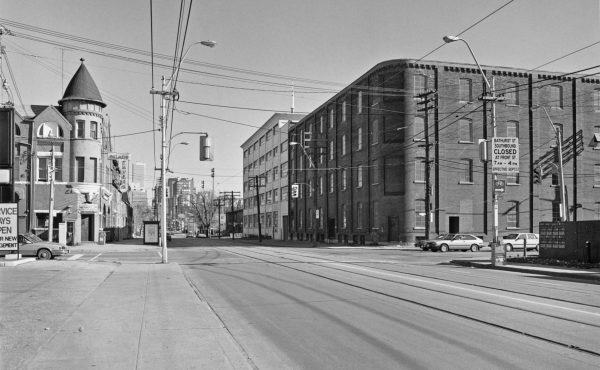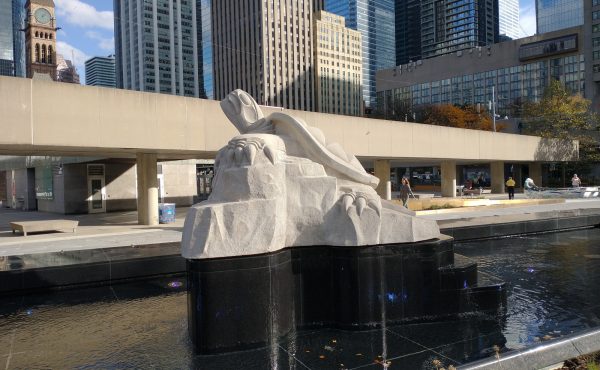

In this edition of Lorinc’s Legal Briefs, let’s begin with Exhibit A: the rulebook of the Canadian Football League.
When Rob Ford leads teenagers onto the gridiron, as he has done on hundreds of occasions, it’s safe to say that he does not counsel them to break the rules, which represent the operating system of the sport he so loves. He does not urge his quarterbacks to cross the scrimmage line and throw the ball. He doesn’t advise the linesmen to grab the facemasks of fast moving running backs.
Why? Because the referees’ flags will fly, and his team will be penalized. It is not complicated.
And so, in the wake of Justice Charles Hackland’s bombshell ruling, we must ponder why Ford — whose day job involves the creation and administration of countless rules, procedures, and policies — was never able or willing to translate the basic principles of organized sport to the arena of politics. It was as if he lived a double life.
This obdurate unwillingness to abide by the rules is Ford’s tragic flaw, and it will be the epitaph on the gravestone of his short, unhappy career as mayor (Ford has stated he will appeal the decision). All politicians have these ticking time bombs within their souls. But few have courted disaster with what can be only described as a perverse desire to be caught out.
If Denise Bellamy’s report about the MFP computer leasing inquiry read like a thriller, Justice Hackland’s meticulous 24-page ruling has the reflective quality of an essay on the intimate relationship between the rule of law and politics.
Ford, explains Hackland, ignored the basic laws governing council debates, chose not to familiarize himself with established procedures, disregarded warnings from colleagues and professional advisors, and failed repeatedly to acknowledge the formal authority of an officer of council.
Those gestures amount to a test of leadership. When the judge quotes at length from integrity commissioner Janet Leiper’s report — which he called “excellent” — on the risks of blurring the lines between private philanthropy and the duties of a public office holder, he includes this trenchant observation from the Bellamy report: “The Mayor of Toronto has many responsibilities, pressures, and functions, but perhaps the greatest is providing leadership for integrity in government….”
“In view of the respondent’s leadership role in ensuring integrity in municipal government,” Hackland continues, “it is difficult to accept an error in judgment defense based essentially on a stubborn sense of entitlement (concerning his football foundation) and a dismissive and confrontational attitude to the Integrity Commission and the Code of Conduct. In my opinion, the respondent’s actions were characterized by ignorance of the law and a lack of diligence in securing professional advice, amount to willful blindness.”
These tough words are directed at the conflict of interest allegation, but they could just as easily apply to any number of Ford’s transgressions: the mishandling of his election finances, the reading-while-driving incident, the attempts to use his office to extract penny-ante benefits for the family business…. The common denominator is an apparent belief that the rules don’t apply to him.
I personally don’t believe that Ford’s pathologically entitled mindset is necessarily linked to wealth per se. I know lots of affluent people who respect society’s laws. But it is difficult to ignore the lines leading from his reckless conduct to the libertarian form of extreme fiscal conservatism that he has espoused since joining council in 2000. There’s not much daylight between Ford’s shrill calls for less and cheaper government and the naïve belief that society somehow functions most effectively in the absence of laws and regulations and the economic or social obligations citizens have to one another.
In this view of the world, “rules” represent nothing but an externally imposed constraint on the personal freedom to act however the hell one pleases.
There will always be some people who believe — out of ideological conviction or due to some private psychological demon — that they can operate in defiance of the law. But only a very few ever find themselves in a position where they are called upon to govern. As Hackland’s judgment makes clear, politicians must be held to a higher standard of behaviour specifically because they serve the public interest. They can never be above the law, because the law — much more than an election result — represents the most enduring form of collective expression in a democracy.
“The suggestion of conflict,” writes Hackland, citing a recent divisional court ruling, “runs to the core of the process of governmental decision-making. It challenges the integrity of the process.”
Rob Ford, the football coach, would never tolerate such defiant conduct on the part of his players, and especially from the team leaders. Yet at virtually every turn, Rob Ford, the mayor, insisted on challenging the “integrity of the process.”
It was only a matter of time before the referee threw him out of the game.




19 comments
Best analysis thus far. Bravo John!
All of this is coupled with what seems a complete inability to reflect on his own situation. Even now Rob and his brother are blaming everyone but themselves for this latest and most serious fiasco.
The most important aspect of this judgement has nothing to do with Ford at all. Ruby has given the people of Ontario a clear path to recall politicians of all stripes and justice Hackland has set the bar trivially low. The list of potential defendants for this type of action is long and heavy on provincial Liberals. Things just got a lot more interesting…
In response to ‘Anon’ – I think the judge’s options were pretty constrained given the range of punishments he had at his disposal to enforce this particular law. It was basically all or nothing (except for the optional punishment of barring Ford from running again for 7 years, which he chose not to do).
I don’t think this sets a general precedent regarding punishments meted out for all politicians breaking any law. If anything, it’s kind of a warning to politicians about constructing laws that have a pre-determined punishment (e.g. minimum sentences).
Many have stated that it’s too bad that this was the hill that he died on, when there were so many other more egregious transgressions. My analogy is that it’s like getting Al Capone for tax evasion. But I think you have hit it here: today’s charges and verdict go to the core of the “apparent belief that the rules don’t apply to him.”
As you say, we’ve seen it so many times in his actions and policies. (Arguably the most glaring example: the Transit City cancellation debacle, when the city, the province and Metrolinx were strung along for a year before coming to the realization that he had never even bothered to fulfill one of the most basic clauses in the agreement: the need to ratify it in Council.) The difference here was that in most cases the consequence was not a violation of the law.
I much prefer the logic in Christie Blatchford’s account. Ford was the hope of the working poor, and the entrepreneur, against an entitled elite that has been pigging-out at the trough at the expense of the taxpayer for decades. Exposing the Toronto Housing Authority waste/incompetence; and TTC ticket-takers at $100k annually, was a revelation to many ( Are they worth this extravagant sum for such a mindless task, when the more-industrious baker at Tim Horton’s must toil at $11/hour?)
If the elites continue to tax, spend, and oppress: look for more crime; more riots; and class warfare: not between the rich and poor, but between the thieves in government, and the workers who support this ineptocracy.
John> Have you tried to add up the $ Ford has cost? From bike lane removal to cancelled contracts? Some money is different than others I suppose, ideologically.
Love how a millionaire born into his cash, working for daddy’s business, is an “entrepreneur” who is the “hope of the working poor”. In a nutshell, this kind of black is white thinking is what is bankruping the right wing currently at all levels of government.
Ford’s savings are more than outweighed by his costs, for instance, to take just two examples: Gary Webster’s firing without cause cost the city half a million, and the reinstatement of the Jarvis middle lane cost $272,000.
@Shawn While the specific amounts spent on undoing previous decisions may be non-trivial and have some political significance, the big cost for me is the opportunity cost, which is, by its nature, unmeasurable. What did Toronto lose in these past two years, in terms of business investment, meaningful progress on creating a consensus around new sources of transit funding, forward-looking ideas about economic development, etc., etc. These are the true costs of the Ford mayoralty.
Thanks John (was actually speaking to the other John, forgetting you are, in fact, a John). But opportunity costs indeed.
For the next 14 days, or maybe longer if Rob gets a stay, Rob Ford will continue to be mayor. However, will he become just a figurehead mayor, much like the Governor-General of Canada or the Queen of Canada? That is, he is just needed to sign documents or make proclamations made by city council as a whole?
I agree with John L, regrading the true costs of the reign of Rob Ford – they have been massive. There is the actual costs of some of his just plain poor and bad decisions, and then the lost opportunity costs. Added up, it’s been a wasted two years, $millions squandered, and on some critical and key issues such as transit, I dare say we have gone backwards – all while the Mayor trumpeted about saving costs on the use of paper-clips at City Hall!
And where was the Mayor of Toronto when there was a sit-down meeting recently, in Ottawa with the Mayors of EVERY OTHER major city in Canada with the Federal Government and bureaucrats to talk about more money for cities, and a fairer deal all around for cities? Shuttling back-and-forth from yet another court-case to Football practices and games! How can Mayor Ford say with the straight face that he’s the hardest working Mayor ever?
RE: saving paper clips at City Hall
I have always said time and again that the slogan of Rob Ford should “Penny-wise, pound foolish”
@Peter – no fat jokes please.
“The most important aspect of this judgement has nothing to do with Ford at all. Ruby has given the people of Ontario a clear path to recall politicians of all stripes and justice Hackland has set the bar trivially low. The list of potential defendants for this type of action is long and heavy on provincial Liberals. Things just got a lot more interesting…”
Not quite. This case has the Municipal Conflict of Interest Act as its fulcrum; any acts of political malfeasance at the provincial level will be subject to different legislation, which probably has a gradient of punishments to suit the severity of the crimes.
Further to the point by Bob Krawczyk, and to an extend the point of lost opportunity costs by John Lorinc, we don’t know how much the costs of Ford’s obstructioninst policies will end up costing for years to come.
How much extra will the next TTC workers contract now that they are an essential service? The data, published in a study by the C. D Howe institute, suggests there is significant upwards pressure on negotiated agreements in the case of essential services.
How much extra will two years of inaction on transit infrastructure cost us? The estimated yearly cost in productivity due to gridlock is likely to worsten as the GTA population increases, while capacity remains stagnant. In addition to some minor Harris style hole-filling that took place the day after Rob Ford became mayor, we’ve lost time and momentum in the debate over how to fund and prioritize transit projects.
It strikes me as beyond perverse that people still take the image Rob and Doug Ford work so hard to project at face value. Hope of the working poor and entrepreneurs? Give me a break. How does denying rapid transit to one of the poorest areas of the city help the working poor? How does alarmist misrepresentation of the ‘huge budget deficit’ in Toronto help entrepreneurs attract talent to the city so they can grow their businesses?
@Lee – agreed all around particularly your last point, about that sham image that Rob & Doug Ford try and project. It’s astounding to me that people can’t see through that, and that voters are still lining up in support of both of them, given all that has gone on.
We have to respect the democratic process, and the will of the people, but what if Winston Churchill’s famous quote was 100% true? – “The best argument against democracy is a five-minute conversation with the average voter”
I hope that Ford simply leaves as he is now a liability to his own cause. But I have to object to claims that the Ford administration – not Ford himself – has accomplished a great deal in two years. It is willful blindness not to accept that whether it be Stintz at the TTC, Holyday on Labour Issues, Minon Wong at Public Works or Del Grande at Budget, Toronto is now has a much more fiscally accountable and better run government than we had under Miller when the servants essentially called the shots. Does anyone outside of a union member really think that the now clawed back Jobs for Life Clause was good public policy, that Toronto is not saving a lot of money by cutting absenteeism rates or that contracting out garbage collection as is done in every other GTA municipality doesn’t save money and that there is much more to be saved from further reforms? If Ford wasn’t such a complete dufus he would have a great platform of accomplishment to run on.
@John Le Blancq
The TTC ticket taker who earned $100k had to work 1000 hours of overtime to hit that number, meaning he practically lived in his ticket booth. Given the time he put in, I have no problem with his income. The Tim Horton’s baker works for $11/hour because she isn’t unionized. If she belonged to a union she might earn something approaching a living wage.